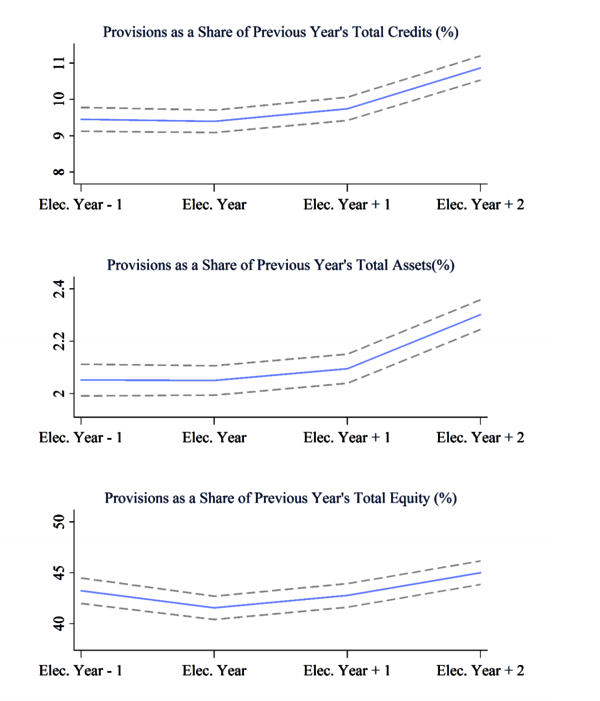Inhalt
Seite 1
IntroductionSeite 2
Political Lending CyclesSeite 3
Credit Quality Auf einer Seite lesenCredit Quality
Loans granted based on favoritism frequently end up being of lower quality than loans which are generated in a competitive market.3 We find this to be the case in our setting as well: We provide evidence of credit quality cycles that also match the electoral cycle. First we examine how loss provisions4 of savings banks differ in the election year and the subsequent two years after the election in comparison to the year(s) prior to the election. If the loans generated during the election year are as safe as other loans, we should not see any systematic relationship of provisions with the electoral cycle. However, Figure 2 shows that loss provisions start to increase right after election years.

Moreover, our results, presented in Table 4, reject the hypothesis that loss provisions do not vary with the election cycle. We find that banks' loss provisions are significantly higher in the years following an election.
Second, we study total interest income of banks. Figure 3 shows that interest income decreases after election years. All three measures show that banks earn less during and after the election year in comparison to the year just before the election. We estimate the election-year's effect on banks' overall performance in a similar manner as before. The results are presented in Table 5. Interest income per Euro of the stock of loans in the previous year is 0.7 cents lower. Considering that the average amount of new commercial loans is €0.52 billion, this result implies that the average bank loses about €3.6 million of interest income per year during the election year and the two years afterward.4
Figure 3: Interest income during election cycles

Source: Own calculation by using German savings banks’ data
Table 4: Political lending’s effect on banks’ risk taking

Source: Own calculation by using German savings banks’ data
Table 5: Political lending’s effect on banks’ interest income

Source: Own calculation by using German savings banks’ data
Conclusion
The local restriction of activities, combined with the substantial influence of local politicians on savings banks' credit decisions, suggests that the use of banks for political purposes is possible. Our empirical results show that politicians actively make use of their position to their own political advantage by granting more loans and loans at more favourable terms in the year when elections in their community take place.
To avoid political lending in the future, the governance of savings banks has to be improved.
The governance structure of German savings banks may hence induce political lending cycles, a misallocation of capital and also result in distortions of the electoral process. To avoid political lending in the future, the governance of savings banks has to be improved. A possible solution could be to occupy prominent positions within the board of directors (Sparkassenverwaltungsrat) and the central credit committee (Kreditausschuss) with independent experts.
References
Akey, P.: Valuing Changes in Political Networks: Evidence from Campaign Contributions to Close Congressional Elections, Review of Financial Studies, 28, 3188-223, 2015.
Carvalho, D.: The Real Effects of Government-owned Banks: Evidence form an Emerging Market, Journal of Finance, 69 (2), 577-609, 2014.
Englmaier, F.; Stowasser, T.: Electoral Cycles in Savings Bank Lending. Munich Discussion Paper, No. 2014-14, 2014.
Haselmann, R., Schoenherr, D.; Vig, V.: Lending in Social Networks, Unpublished Working Paper, 2014. Khwaja, A. I.; Mian, A.: Do Lenders Favor Politically Connected Firms? Rent Provision in an Emerging Market, Quarterly Journal of Economics, 120 (4), 1371-411, 2005.
Nordhaus, W. D.: The Political Business Cycle, Review of Economic Studies, 42 (2), 169-190, 1975. Sapienza, P.: The Effects of Government Ownership on Bank Lending, Journal of Financial Economics, 72, 357-384, 2004.





